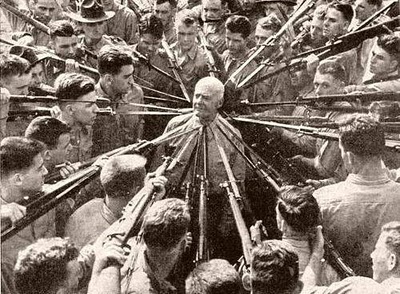Disobey! From Mass Propaganda to Inverted Totalitarianism & the True Meaning of Rebellion.

{source}
“Corporations are not concerned with the common good. They exploit, pollute, impoverish, repress, kill, and lie to make money. They throw poor people out of homes, let the uninsured die, wage useless wars for profit, poison and pollute the ecosystem, slash social assistance programs, gut public education, trash the global economy, plunder the U.S. Treasury and crush all popular movements that seek justice for working men and women. They worship money and power.” ~ Chris Hedges, Death of the Liberal Class
If you think you’ve heard enough about how entire societies are turning into “self-consuming machines of death,” preying on their own people, culture, art and politics under the premise of unlimited progress, then you’re up for a visual treat and another wake-up call.
Based on the book Death of the Liberal Class by award-winning journalist Chris Hedges, the online documentary Obey explores how the rise of the corporate state has accounted for most economic and environmental collapses of the past century—through the selfish use of mass propaganda to serve their private interest.
Film-maker Temujin Doran synthesizes Hedges’ message in this 50-minute brilliant composition made entirely out of footage found on the web.
“All my means are sane. My motive and objective, mad.” ~ Hermann Melville
*Complement Obey with a closer, more comprehensive look at Death of the Liberal Class, through Chris Hedges’ lecture at the Sanctuary for Independent Media. On a longer afternoon, help yourself to legendary Adam Curtis’ The Century of the Self: a full account of how Freud’s ideas were metamorphosed into mass propaganda from the early twentieth century to our days—in an attempt to “control the dangerous crowd in an age of mass democracy” (Curtis).
So, what is Inverted Totaliatarianism?
“Inverted totalitarianism, unlike classical totalitarianism, does not revolve around a demagogue or charismatic leader. It finds expression in the anonymity of the Corporate State. It purports to cherish democracy, patriotism, and the Constitution while manipulating internal levers.” (Hedges)
In other words, it is a more subtle form of dictatorship, masked as freedom: the freedom to choose between one product and another, the freedom to consume until we end up consuming ourselves, the freedom to spend our planet’s limited resources to fuel an imaginary happiness we can never find beyond an empty screen.
The freedom to choose one prison or another.
“The commercial media…help citizens feel as if they are successful and have met these aspirations, even if they have not. They tend to neglect reality (they don’t run stories about how life is hard, fame and fortune elusive, hopes disappointed) and instead celebrate idealized identities—those that, in a commodity culture, revolve around the acquisition of status, money, fame and power, or at least the illusion of these things.
The media, in other words, assist the commercial culture in ‘need creation,’ prompting consumers to want things they don’t need or have never really considered wanting. And catering to these needs, largely implanted by advertisers and the corporate culture, is a very profitable business.
A major part of the commercial media revolves around selling consumers images and techniques to ‘actualize’ themselves, or offering seductive forms of escape through entertainment and spectacle. News is filtered into the mix, but actual news is not the predominant concern of the commercial media.” (Hedges)
Seduction has trampled reasoning. Feelings have cancelled intellect. Propaganda has burned through any real knowledge. Greed has devoured community. Magic has replaced reality.
Welcome to the Age of Alien. Forget sci-fi. We’re the real aliens on this planet, ever since we started cutting our own umbilical cord. The worst case of alienation is that in which you think you belong.
Rebellion Vs. Revolution.
Revolution is the replacement of one power system with another. It is revolutionary until it stops being a movement and it turns into the dominant reality. But change is our only constant. Whatever doesn’t change (through constant questioning) eventually becomes stagnant and so, in time, what started as a revolution settles and transforms into the devil it initially tried to fight—it turns into the status quo.
Rebellion, on the other hand, is “a perpetual alienation from power.” The constant protest against anything that imprisons our freedom—especially the very societal confines meant to protect us. Our daily acts of rebellion keep us alive and impede our home from turning into a cage.
“I believe that the truth is the only force that will set us free. I have hope, not in the tangible or in what I can personally accomplish, but in the faith that battling evil, cruelty, and injustice allows us to retain our identity, a sense of meaning and ultimately our freedom. Perhaps in our lifetimes we will not succeed. Perhaps things will only get worse. But this does not invalidate our efforts.” (Hedges)
One of the most unreasonable thinkers, Albert Camus, resonates:
“One of the only coherently philosophical positions is revolt. It is a constant confrontation between man and his obscurity… It is not aspiration, for it is devoid of hope. That revolt is the certainty of a crushing fate without resignation, that ought to accompany it.” (An Absurd Reasoning).
It sounds better with Ken Wilber’s creative twist in A Brief History of Everything, “The truth will not necessarily set you free, but truthfulness will.”
Truth as a statement, a movement, a religion, a culture or any other sub-reality is always relative to a certain extent. There are billions of living organisms on this planet. The idea of an ultimate settled truth or belief is myopic at its best and it does not conform to any of the natural laws dominating our universe. The more you know, the more you realize the little you know. At any point in time, you’ve just been born.
But truthfulness is absolute because rather than a “thing” it is a way of operating, of living—something each creature can (and should) attain in this lifetime. It’s the always evolving end to our means, our lifetime goal.
Ultimate truth then, if it exists, must be a dynamic verb, not a stagnant noun. And as such, it cannot be ultimate. And in order to keep on refreshing this page, we must constantly question it and revise it.
Never stop questioning?
“It is one of the great ironies of corporate control that the corporate state needs the abilities of intellectuals to maintain power, yet outside of this role it refuses to permit intellectuals to think or function independently.” (Hedges)
While our feelings are high on corporate media drugs, what has most suffered in our self-destructive quest for unlimited progress, is our mind and the clothes we dress it in—our education. Corporations are not just social entities. Their power over us begins in our own head. It starts with the silent agreement to trust them with our desires.
Why must a good education demand, equal and expect money? Where is the missing link, the reasoning behind this fact—other than corporate greed that has poisoned every system we depend on for personal and social growth? Since when has this turned into our dominant reality and why have we let it?
We’ve been replacing the vital, critical ability of our intellect by the self-delusional placebo of consumerism. Chris Hedges explains it in Empire of Illusion: The End of Literacy and the Triumph of Spectacle:
“We’ve bought into the idea that education is about training and ‘success,’ defined monetarily, rather than learning to think critically and to challenge. We should not forget that the true purpose of education is to make minds, not careers. A culture that does not grasp the vital interplay between morality and power, which mistakes management techniques for wisdom, which fails to understand that the measure of a civilization is its compassion, not its speed or ability to consume, condemns itself to death.”
Creativity as a form of rebellion.
Osho said that “creativity is the greatest form of rebellion.” It is so because creativity is not a transitory feeling but a state of mind, a modus operandi, a constant state of death and rebirth.
Any new creation or rearrangement of the old, demands the questioning of the stagnant. It requires you to die to your smaller, comfortable self daily and stretch your skin into the uncertainty of imagination. It’s the most fatal blow against the status quo—which, like any given reality, begins in the mind.
Creativity and rebellion share the same dynamic. Like your heart, they can’t stop working. They pump your intellectual and imaginative blood, they bring ultimate freedom, because the essence of freedom is the power to choose differently. And creativity is the never-ending ability to honor your choice and your truth.
An individual devoid of either, just like a body devoid of a heart, can’t be a person. A shadow of life is not life. As a response to our silent annihilation by all that is not life, a constant protest against this soul-killing misunderstanding is vital and urgent.
We don’t rebel because we want to, just like we don’t create because it serves an aribitrary higher purpose some may believe in and others not. We rebel because it is an intrinsic part of our humanity and we just can’t help it.
We, humans, are the most creative animals on earth. As such, we are obligated by universal laws to not just accept but dutifully exercise the same odds that brought us into existence, namely, our most basic human rights: rebellion and creativity. You can’t have one without the other.
Like our old stoic master Marcus Aurelius put it, “Where life is possible at all, a right life is possible.”
I say, let’s shout more often and a little louder over the rooftops of our tired world—like the educated barbarians we truly are.
Instead of selling our souls into oblivion to the magic, corporate slavery and the cold dead fingers of the status quo, let’s punch our minds with courage every morning, bang our self-consuming confusion against every possible wall, pinch ourselves daily until we start bleeding truth…and paste this note on our bathroom mirror:
“Oh my soul. Do not aspire to immortal life, but exhaust the limits of the possible.” ~ Pindar, Pythian III
***
{Join us on Facebook, Twitter, Instagram & Pinterest}

